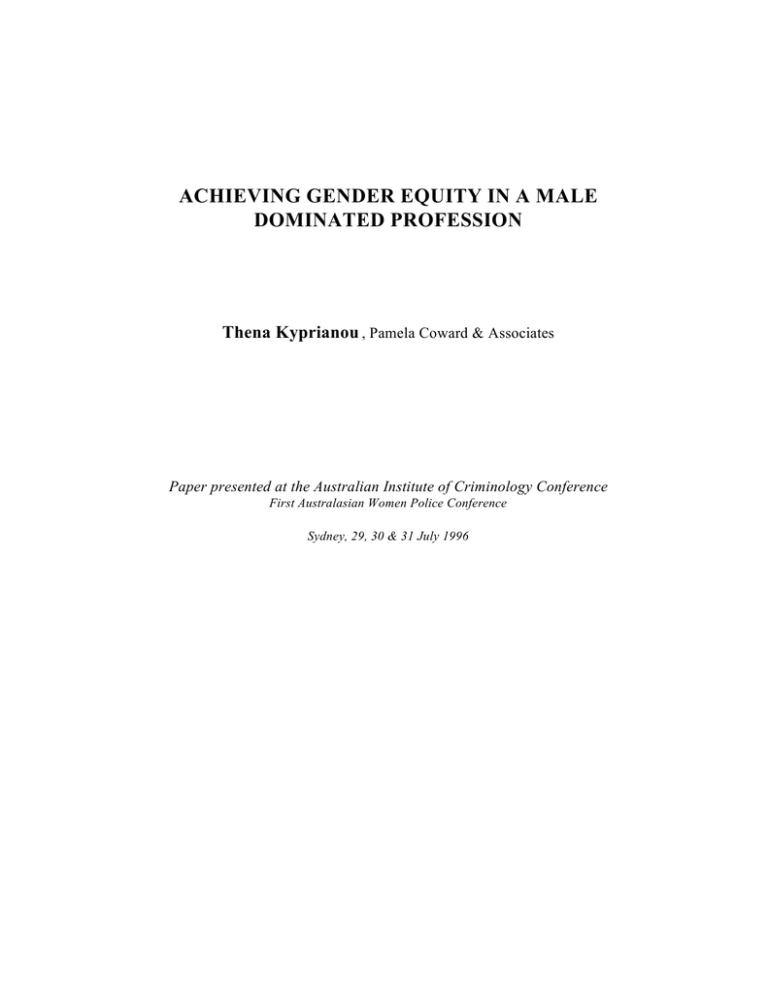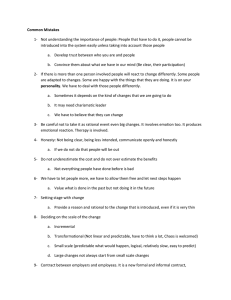
ACHIEVING GENDER EQUITY IN A MALE
DOMINATED PROFESSION
Thena Kyprianou , Pamela Coward & Associates
Paper presented at the Australian Institute of Criminology Conference
First Australasian Women Police Conference
Sydney, 29, 30 & 31 July 1996
For the last twelve years I have practised as a lawyer in the Australian Capital Territory
(A.C.T.) and for two of those years I have chaired the A.C.T. Law Society's forum into gender
equality in the legal profession. In my view, female lawyers and policewomen share similar
problems in their attempts to address gender inequality within their professions. Both our
professions or vocations are clearly male dominated: the majority of employees are male and,
more importantly, the leaders of the profession are male.
Although each particular male dominated profession or vocation has its own impediments f or
the women trying to reach the top, a lot of these impediments are common to all maledominated professions. The reason for this is that the impediments are created by a wide
culture of sexism which is unfortunately the social norm.
Evidence of Gender Inequality
The most obvious measure of gender inequality in male dominated industries is numbers. The
culture of professions such as the legal profession and policing is such that women are not
attracted to them in great numbers. As a result even at the lowest levels of the profession there
are more men than women. The problem of inequality of gender becomes worse at the higher
levels of the profession. Much has been written about the reason for the failure of women to
achieve promotion. It would be hard to deny that a major reason for this failure is cultural.
"The sexual division of labour still finds an overwhelming proportion of women in jobs which
reflect the caring, personal support, and ancillary roles that have been deemed appropriate for
women. For example, in Australia in 1994, 55% of women workers were found in two
occupational groups - clerical and sales and personal services - compared with only 16% of
male workers. ... women in paid work generally including professional women in authoritative
positions are assigned roles that are derivative of caring, as a gloss on their designated work.
The phenomenon is discernible not just in the way women in law are assigned to areas of
practice, such as Family Law, but in the way women are expected to care f or colleagues and to
humanize the environmental backdrop of the workplace.”1 Just like in the legal professional
women tend to be allocated cases in family law or domestic conveyancing, women in the
Police Forces seem to be allocated caring type tasks such as dealing with victims of sexual
abuse or child welfare cases. Of course there is nothing wrong with dealing with these sort of
cases, however, when it comes to promotion opportunities the caring role allocated to women is
not as highly valued and the employees who have been allocated these roles tend to be
overlooked in favour of employees who have been performing more masculine activities.
The next problem faced by women in male dominated professions is promotion on "merit".
The argument is often put quite passionately, that at the senior levels of a profession, people
should be appointed on merit and not because of their gender. The assertion is that
discriminatory practices have been removed from the profession and any person who has what
it takes, be it a man or a woman, could make it to the top. The argument is also often put that it
would be a mistake to appoint women to top positions on anything other than merit because the
appointments would then be seen as tokenism and would do more harm to the advancement of
women than good. "Merit" is a rather difficult term to define. Qualities that may appear
meritorious to one person may not necessarily appear as such to another. The difficulty that
women face in competing on merit is that merit is primarily defined by the men who got there
first. Good organisational skills and patience are qualities often associated with femininity
which are not often taken into account when defining merit. On the other hand, in my
experience in the legal profession, arrogance, the willingness and ability to walk all over your
colleagues, and lack of sensitivity, are often seen as strong desirable characteristics. Of course,
appointments must be made on merit, but, the definition of "merit" may need to be revisited.
Why should we address gender inequality?
Apart from the women who desire to reach the top in their chosen careers and who see that as a
mark of success in their lives, who else would benefit from removing gender inequity in the
police force? There is no doubt in my mind that the police force as a whole, and the
community at large, would benefit by achieving more gender equity in the police force.
We should not take it for granted that the emphasis which has been put on certain aspects of
how the job gets done is the right one just because it has always been done that way. In
families requiring two incomes for their economic survival, parents have to live with a kind of
schizophrenia while their children are growing up. Whilst we have accepted that women have
to work for economic reasons, we have not accepted that we need to balance the roles of
professional and parent. It is still expected of both men and women that if they are serious
about their career they must put it above all else including family. However, women are seen
as the ones who will go out into the workforce because of economic necessity, but who will
nonetheless have to also do the caring jobs, and not expect to advance too far up the ladder of
their chosen career. If it was the situation that both men and women advanced equally up the
ladder I am confident that the way we assess what is important in our lives and what role
should be valued more would change. Men who may not wish to continue to spend inordinate
amounts of time at work at the expense of their family life would also benefit from a system
which allows both men and women to reach the top and become the decision makers in equal
numbers. The priorities assigned to different roles would undoubtedly change if women
contributed equally to a profession's culture.
Like lawyers, police officers have a crucial role in the administration of justice in our
community. Every individual thinks differently but generalisation may be made about how
women respond to a set of circumstances and how men respond to the same set of
circumstances. Of course, not all men think the same and not all women think the same but
just as people from different cultural backgrounds are likely to understand better the behaviour
and thought processes of other people in that cultural group, so too people of the same sex are
more likely to understand each other better. So a legal system administered by a
preponderance of males must inevitably have shortcomings in its delivery of justice to women.
At the moment because of the numbers of males in the Police Force, crucial decisions on what
the community needs from its Police Force are primarily made by men. The input that women
have in those decisions is far less than that of men yet the community that the Police Force
serves is made of 50% of females. The Police Force's relevance to the community and its
image can only improve by having more female input in the policy and decision making of the
police.
Addressing the inequality
Unfortunately there is no quick fix solution to the problem of achieving gender equality within
any profession. Ultimately the problem has to be addressed through a change of culture both
within the profession and outside it. Women in every walk of life have to accept that they are
part of the community and the only way that equality can be achieved is for them to take
positive steps to do so. Fundamental to change is education. Despite the existence of antidiscrimination legislation for over a decade, discrimination against women on the grounds of
their sex, marital status or pregnancy are not at all uncommon. It is vital that the Police Force
as a whole be educated as to what constitutes sexual discrimination and sexual harassment.
There are many cases which have been decided by Equal Opportunity Tribunals during the last
ten years which define what kind of conduct is unacceptable. I would not be at all surprised if
a large proportion of policemen are totally unaware of the kind of conduct which the Tribunals
have held unacceptable. In the work I performed as Chair of the A.C.T. Law Society's Gender
Equality Forum I was left with the very strong impression that a very large number of legal
practitioners were totally unaware of what constituted sexual harassment and sexual
discrimination. Seminars which have the purpose of educating all employees, not just women,
about anti-discrimination legislation and decisions can serve a useful role.
Developing and implementing a code of equal opportunity in employment can also be helpful.
The code should include:(a)
the principles of discrimination law;
(b)
guide-lines for interviews;
(c)
policy and strategic planning for equal employment opportunity And affirmative action
in the workplace;
(d)
principles, methods and strategies of eliminating sexual harassment in the workplace;
(e)
policy for staff with family responsibilities;
(f)
qualities which are essential and desirable in achieving promotion.
By having such a code of practice and implementing it people are forced to think about issues
such as definition of merit and the balance of priorities between family and career commitment.
Another recommendation that the A.C.T. Gender Equality Forum made and after a hard fought
and protracted struggle, the A.C.T. Law Society adopted, was the inclusion in the Guide to
Professional Conduct a rule which specifically makes it misconduct for a member of the
Society to engage in sexual discrimination or harassment. This conduct is already unlawful
under the Sex Discrimination Act and a number of other Acts, but by making it potentially
professional misconduct it could act as a real deterrent. Of course, having such a rule in a code
of conduct is only useful if the code is actually enforced and it can only be enforced if the
victims of the discrimination feel comfortable about lodging a complaint.
Finally, affirmative action is an essential part of the plan to remove gender inequality in any
profession. The young women entering the profession need role models. Unless they have
those role models they have to see themselves as pioneers and record-breakers in trying to
advance their careers to the top. Most people, be they men or women, do not like seeing
themselves as record breakers whether they have the ability to reach the top or not. In answer
to the criticism that affirmative action puts women in positions that they do not deserve on
merit, I challenge those who hold this view to name a woman who has been appointed to a
senior position on an affirmative action programme and is not managing to perform the job
admirably.
End Note
1
Thornton, M. "Dissonance and Distrust: Women in the Legal Profession" - Oxford
University Press 1996 p. 24.




